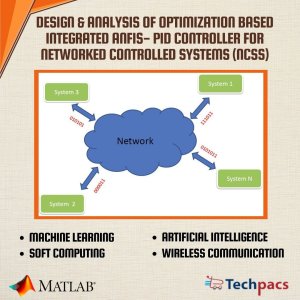Enhanced Multi-Constraint Multicasting Routing in Mobile Ad Hoc Networks using Random Waypoint Mobility Model and Differential Evolution Algorithm
Problem Definition
MANET architecture faces numerous challenges due to resource limitations. Limited bandwidth in wireless connections compared to cellular networks hinders data transfer capabilities. The dynamic topology of MANETs, with nodes moving independently, leads to network changes that occur rapidly and unexpectedly, posing difficulties for efficient routing. Routing overhead is a concern as routes to destinations frequently change due to node mobility, creating idle routes and unnecessary routing overhead. Additionally, battery limitations make it challenging to keep devices charged in mobile environments, highlighting the importance of energy-efficient solutions.
Furthermore, the security risks associated with wireless connections in MANETs raise concerns about data privacy and integrity. These key limitations, problems, and pain points within the MANET domain underscore the necessity for innovative solutions to enhance network performance and address these challenges effectively.
Objective
The objective is to address the challenges faced by Mobile Ad-Hoc Networks (MANET) due to limited resources by developing a Multi-Constraint Multicasting Routing Protocol (DEMMRP) that optimizes energy consumption, packet delivery ratio, hop count, bandwidth, overhead, and delay. By combining a Differential Evolutionary algorithm and fuzzy inference system, the proposed work aims to improve communication performance compared to traditional protocols like EFMMRP. Through careful network initialization, node mobility simulation, and efficient route selection, the goal is to enhance data transmission efficiency and overall network performance in MANET environments.
Proposed Work
In the proposed work, the challenges faced by MANET due to limited resources are addressed by focusing on parameters such as energy consumption, packet delivery ratio, hop count, bandwidth, controlled overhead, and packet delivery delay. A Multi-Constraint Multicasting Routing Protocol (DEMMRP) is developed using a combination of Differential Evolutionary algorithm and fuzzy inference system to optimize the routing protocol for better communication. The analysis of DEMMRP is compared with the traditional protocol EFMMRP in terms of performance metrics. The network structure is initialized with consideration to the network area, number of nodes, and mobility, followed by implementing a Random waypoint mobility model to simulate the movement of nodes. The selection of the source and destination nodes is carefully made to ensure efficient data transmission.
The application of Differential Evolution (DE) optimization algorithm helps in determining the best route for data transmission, leading to improved performance in terms of packet delivery ratio, controlled overhead, and packet delivery delay. Through this approach, the proposed work aims to enhance the efficiency of communication within MANET by addressing key challenges such as limited bandwidth, dynamic topology, routing overhead, battery limitations, and security risks.
Application Area for Industry
This project's proposed solutions can be applied in various industrial sectors such as manufacturing, logistics, healthcare, and defense where the use of mobile ad hoc networks (MANET) is prevalent. Industries often face challenges related to limited bandwidth, dynamic topology, routing overhead, battery limitations, and security risks when utilizing MANET for communication and data transfer. By implementing the Multi-Constraint Multicasting Routing Protocol (DEMMRP) developed in this project, industries can overcome these challenges by optimizing energy consumption, packet delivery ratio, hop count, bandwidth, overhead, and packet delivery delay.
The application of the Differential Evolutionary algorithm and fuzzy inference system in DEMMRP enables industries to establish efficient and secure communication paths within MANET. By utilizing the Random waypoint mobility model and DE optimization algorithm, industries can ensure the selection of the best routes for data transmission in dynamic and resource-constrained environments.
Implementing the proposed solutions not only enhances network performance but also improves overall operational efficiency, data security, and communication reliability in various industrial domains.
Application Area for Academics
The proposed project can significantly enrich academic research, education, and training in the field of Mobile Ad hoc Networks (MANETs) by addressing the challenges faced by this architecture. The implementation of a Multi-Constraint Multicasting Routing Protocol (DEMMRP) using Differential Evolution algorithm and fuzzy inference system can provide valuable insights and solutions to enhance the performance of MANETs.
This project can be particularly relevant for researchers, MTech students, and PHD scholars in the field of wireless communication, networking, and optimization. By studying the analysis and comparison of the proposed DEMMRP with the traditional EFMMRP in terms of parameters such as energy consumption, packet delivery ratio, hop count, bandwidth, controlled overhead, and packet delivery delay, scholars can gain a deeper understanding of efficient routing protocols for MANETs.
Furthermore, the utilization of Differential Evolution algorithm in this project can offer a novel approach to solving optimization problems in network routing, which can be applied in various research domains beyond MANETs.
Researchers and students can leverage the code and literature of this project to explore innovative research methods, simulations, and data analysis techniques in their own work.
In educational settings, this project can serve as a valuable case study for teaching concepts related to network optimization, routing protocols, and evolutionary algorithms. By implementing and analyzing the performance of DEMMRP, students can develop practical skills in designing and evaluating communication systems under dynamic and resource-constrained environments.
In conclusion, the proposed project has the potential to advance academic research, education, and training by offering a comprehensive study on improving the performance of MANETs through innovative routing protocols and optimization techniques. Future research can explore further enhancements to the DEMMRP and investigate its application in real-world scenarios to address the evolving challenges in wireless communication networks.
Algorithms Used
The proposed work in the project involves overcoming challenges by extending parameters such as energy consumption, packet delivery ratio, hop count, bandwidth, controlled overhead, and packet delivery delay. A Multi-Constraint Multicasting Routing Protocol (DEMMRP) is developed using the Differential Evolutionary algorithm and fuzzy inference system. The network structure is initialized with specific parameters, and the mobility of nodes is achieved through a Random waypoint mobility model. The source and target nodes are selected for data transmission. The Differential Evolution optimization algorithm is applied to find the best route for data transmission, and the results are compared with the existing scheme in terms of packet delivery ratio, controlled overhead, and packet delivery delay.
Keywords
SEO-optimized keywords: MANET architecture, limited bandwidth, dynamic topology, routing overhead, battery limitations, security risks, Multi-Constraint Multicasting Routing Protocol, DEMMRP, Differential Evolutionary algorithm, fuzzy inference system, network structure, Random waypoint mobility model, Differential Evolution optimization algorithm, packet delivery ratio, controlled overhead, delay in packet delivery, wireless network, performance optimization, parameter optimization, algorithm enhancement, network optimization, wireless communication, optimization techniques, network parameters, network performance evaluation, quality of service, resource allocation, network throughput, network latency, optimization algorithms, wireless network management.
SEO Tags
MANET architecture, limited bandwidth, dynamic topology, routing overhead, battery limitations, security risks, energy consumption, packet delivery ratio, hop count, bandwidth, controlled overhead, packet delivery delay, Multi-Constraint Multicasting Routing Protocol, DEMMRP, Differential Evolutionary algorithm, fuzzy inference system, network structure, Random waypoint mobility model, Differential Evolution optimization algorithm, wireless network, performance optimization, algorithm enhancement, network optimization, wireless communication, optimization techniques, network parameters, quality of service, resource allocation, network throughput, network latency, optimization algorithms, wireless network management.
| Shipping Cost |
|
No reviews found!

















































No comments found for this product. Be the first to comment!